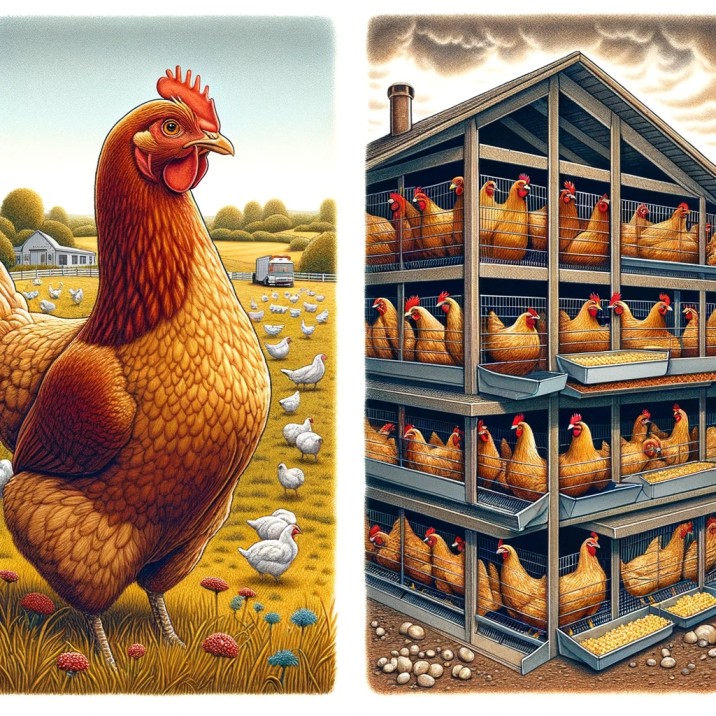Pasture-raised eggs are produced by hens that are allowed to roam freely outdoors in a pasture, as opposed to being confined in small cages or crowded barns. These hens have access to the outdoors, where they can engage in natural behaviors such as foraging for plants and insects, dust bathing, and walking. This outdoor access must be significant – typically, pasture-raised hens have 108 square feet of pasture each, though this can vary.
The Difference in Living Conditions

The living conditions of hens in pasture-raised systems versus conventional egg-producing systems highlight significant contrasts in animal welfare and lifestyle. In pasture-raised systems, hens live much of their lives outdoors, with ample space to roam, forage, and engage in natural behaviors. Each hen typically has access to about 108 square feet of pasture, although this can vary. This environment allows them to exhibit innate behaviors like scratching, pecking at the ground, dust bathing, and sunbathing. The exposure to natural light and fresh air also contributes to their overall health and well-being.
In contrast, conventional egg production often involves confining hens to small cages (battery cages) or slightly larger enclosed spaces (cage-free systems). In battery cages, hens have very limited space, often less than the size of a sheet of paper per bird, restricting their ability to move freely or spread their wings. Even in cage-free systems, while the hens are not in cages, they are still confined within a barn and the space per hen can be limited. These conditions can lead to stress and aggressive behavior among the birds.
Free-range systems offer more freedom than battery cages or cage-free systems, as hens have some access to the outdoors. However, the quality and duration of outdoor access vary greatly and may not provide the same level of freedom and natural living conditions as pasture-raised systems. In contrast, pasture-raised hens enjoy a more dynamic and natural lifestyle, which is believed to contribute to healthier and happier birds. This difference in living conditions not only impacts the welfare of the hens but also influences the quality and nutritional value of the eggs they produce.
Nutritional Benefits

The nutritional benefits of pasture-raised eggs are a key aspect that distinguishes them from eggs produced in conventional systems. Due to the hens’ access to a natural diet that includes grass, insects, and seeds, in addition to regular feed, pasture-raised eggs have been found to contain higher nutritional values.
Studies suggest that pasture-raised eggs have a better nutritional profile, including higher levels of omega-3 fatty acids, which are essential for heart health and cognitive function. They also tend to have a higher concentration of vitamins A and E, both of which are crucial for immune function and skin health. Moreover, these eggs often contain more beta-carotene, evident in the darker yolks, which is beneficial for eye health.
The increased presence of these nutrients is directly linked to the varied diet of the hens. Unlike hens in confined operations, pasture-raised hens consume a more natural, diverse diet. This not only impacts the nutritional content of the eggs but also can influence the flavor profile, making them a preferred choice for many consumers looking for both health benefits and quality in their food choices.
Environmental Impact
Pasture-raised systems can also have a positive impact on the environment. The rotational grazing practiced in many pasture-based farms helps in maintaining soil health and biodiversity. The hens contribute to the ecosystem by naturally fertilizing the soil and controlling pests through their foraging.
Taste and Quality

The taste and quality of pasture-raised eggs are often highlighted as superior to those of eggs from conventional farming systems, a factor that significantly influences consumer preference. The distinctive characteristics of pasture-raised eggs in terms of flavor and overall quality can be attributed to the hens’ diet and lifestyle.
Many consumers and culinary experts report that pasture-raised eggs have a richer, more robust flavor compared to conventional eggs. This enhanced taste profile is largely due to the diverse diet of the hens, which includes a variety of grasses, insects, and seeds found in their natural pasture environment. This diet leads to eggs with yolks that are typically richer and creamier, providing a deeper and more complex flavor experience.
Pasture-raised eggs often feature yolks that are darker and more vibrant in color, typically ranging from a deep yellow to a bold orange hue. This is a direct result of the higher beta-carotene content in the hens’ diet, which is naturally found in leafy greens and other plants that hens forage in pastures. The richly colored yolks are not only visually appealing but are also indicative of a higher nutrient content.
The texture of pasture-raised eggs is another aspect where they stand out. The whites are often described as firmer and less watery, while the yolks are creamier, making them ideal for a variety of cooking methods, from poaching to baking. Additionally, because pasture-raised eggs often come from smaller, local farms, they tend to be fresher than their supermarket counterparts. This freshness can further enhance their taste and textural qualities.
The natural lifestyle and diet of pasture-raised hens not only contribute to the nutritional superiority of the eggs but also play a significant role in their overall quality. Consumers who prefer these eggs often cite the lack of antibiotics and synthetic hormones, common in conventional egg production, as a key factor in their choice. This natural approach aligns with the growing trend towards healthier and more sustainable food sources.
Cost and Accessibility
One of the downsides of pasture-raised eggs is their higher cost compared to conventional eggs. The extensive land requirements and labor-intensive nature of pasture-raising hens contribute to the higher price. Additionally, while becoming more widely available, pasture-raised eggs are still less accessible than conventional eggs, especially in urban areas and budget stores.
Comparison with Other Egg Types
Cage-Free Eggs
Cage-free eggs come from hens that are not confined to cages but live inside large barns. While they have more space than battery-caged hens, their movement is still restricted, and they typically do not have access to the outdoors.
Free-Range Eggs
Free-range hens have some access to the outdoors, but the amount of space and quality of the outdoor area can vary greatly. Unlike pasture-raised systems, there’s no standard requirement for the amount of time the hens spend outside or the quality of the outdoor space.
Organic Eggs
Organic eggs are produced following specific standards for organic farming. These include the use of organic feed and the prohibition of antibiotics and certain pesticides. While organic eggs can be pasture-raised, being organic doesn’t automatically mean the hens have ample outdoor access.
Pasture-raised eggs come from a system that prioritizes animal welfare, environmental sustainability, and nutritional benefits. While more expensive, they offer ethical and health advantages that are increasingly valued by many consumers. Understanding these differences helps in making informed decisions at the grocery store and supports a more sustainable and ethical food system. As awareness grows, pasture-raised eggs represent not just a choice in food, but a step towards a more humane and environmentally conscious approach to agriculture.

